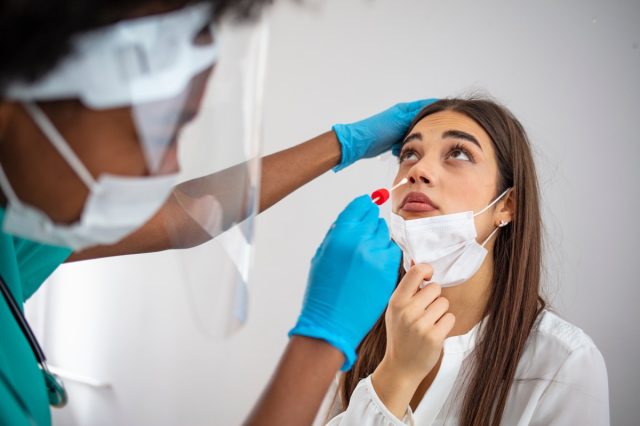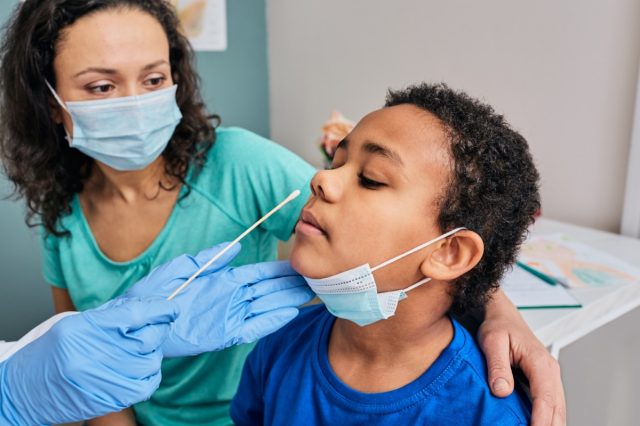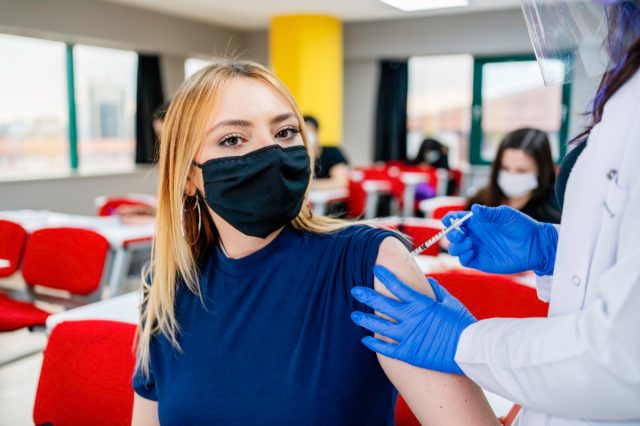Health
A COVID Surge is Coming and Here’s How to Stay Safe

|
|
COVID cases have been declining in the U.S., which have people questioning if we’re still in a pandemic–we are, but experts are concerned about a potential surge this winter because of rising cases in European countries like the U.K., France and Italy. “In the past, what’s happened in Europe often has been a harbinger for what’s about to happen in the United States,” says Michael Osterholm, director of the Center for Infectious Disease Research and Policy at the University of Minnesota. “So I think the bottom line message for us in this country is: We have to be prepared for what they are beginning to see in Europe.”
Another thing experts are monitoring closely is new omicron variants popping up. “We look around the world and see countries such as Germany and France are seeing increases as we speak,” says Lauren Ancel Meyers, director of the UT COVID-19 Modeling Consortium at the University of Texas at Austin. “That gives me pause. It adds uncertainty about what we can expect in the coming weeks and the coming months.”
While it’s likely the U.S. will experience a spike in cases, it’s not for certain. NPR, reports, “That’s because it’s not clear whether Europe’s rising cases are related to people’s greater susceptibility to new subvariants they’ve not yet been exposed to. In addition, different countries have different levels of immunity.” Justin Lessler, an epidemiologist at the University of North Carolina who helps run the COVID-19 Scenario Modeling Hub says, “If it is mostly just behavioral changes and climate, we might be able to avoid similar upticks if there is broad uptake of the bivalent vaccine,” Lessler says. “If it is immune escape across several variants with convergent evolution, the outlook for the U.S. may be more concerning.” Read on—and to ensure your health and the health of others, don’t miss these Sure Signs You’ve Already Had COVID.
According to NPR, “The levels of virus being detected in wastewater are up in some parts of the country, such in Pennsylvania, Connecticut, Vermont and other parts of the Northeast. That could be an early-warning sign of what’s coming, though overall the virus is declining nationally.”
“It’s really too early to say something big is happening, but it’s something that we’re keeping an eye on,” says Amy Kirby, national wastewater surveillance program lead at the Centers for Disease Control and Prevention.
NPR reports, “But infections and even hospitalizations have started rising in some of the same parts of New England, as well as some other northern areas, such as the Pacific Northwest, according to Dr. David Rubin, the director of the PolicyLab at Children’s Hospital of Philadelphia, which tracks the pandemic. “We’re seeing the northern rim of the country beginning to show some evidence of increasing transmission,” Rubin says. “The winter resurgence is beginning.”


David Souleles, MPH, Director of the COVID-19 Response Team at the University of California, Irvine tells us, “The evidence of a potential surge can be seen by looking at our neighbors in the east and west, specifically Europe where case numbers are inching up. There have also been reports that we should expect a bad flu season, which will complicate COVID case monitoring since symptoms are similar. To prevent severe reactions to COVID and the flu, we need to be vaccinated and take other measures, including hygiene, good sleep, eating well, tracking case counts in your community, and being mindful of spreading the virus.”
A top-ranking Chicago doctor does expect an uptick in cases and told NBC, “I haven’t seen anything really scary yet on the horizon, but I do think we’re going to see a COVID surge. I would be the happiest person alive if we get to February or March and we haven’t seen even a small COVID surge, just because it’s respiratory season and the way that we see flu and RSV and everything else surge in the winter, I think we’re expecting at least some COVID surge,” Chicago Department of Public Health Commissioner Dr. Allison Arwady said. “The question is really what does that looked like with variants?”






In addition to worrying about COVID this winter, experts are also warning about the flu. Dr. Benjamin Alli, MD/ PhD Sakellerides professor and author of Not Just Covid, which comes out later this month, tells us, “This winter is expected to be especially brutal due to influenza (twin virus) and other respiratory illnesses that have been increasing in various areas – largely due to misinformation (controversy over continued use of a mask), and a decline of those in the healthcare industry wanting to continue on for various reasons, include stress, personal crisis, pay and more.”
NBC reports, “Hospitals nationwide are preparing for another winter with Covid — the first one that’s also expected to include high levels of influenza and other respiratory illnesses that have simmered quietly in the background for the past two years. Flu cases are already rising in parts of the U.S., according to the Centers for Disease Control and Prevention. Pediatricians, too, are seeing a growing number of children sick with respiratory syncytial virus, or RSV, and enteroviruses. And despite a downward trend in Covid, tens of thousands of new cases are still being diagnosed every day.”






More people have gotten the vaccine, which will help with some immunity.
NPR reports, “We have a lot more immunity in the population than we did last winter,” says Jennifer Nuzzo, who runs the Pandemic Center at the Brown University School of Public Health. “Not only have people gotten vaccinated, but a lot of people have now gotten this virus. In fact, some people have gotten it multiple times. And that does build up [immunity] in the population and reduce overall our risk of severe illness,” Nuzzo says.
However, interest in the latest booster is really low. “Nearly 50% of people who are eligible for a booster have not gotten one,” says William Hanage, an associate professor of epidemiology at the Harvard T.H. Chan School of Public Health. “It’s wild. It’s really crazy.” The new booster became available over Labor Day weekend and fewer than 8 million people have gotten one. Since it is likely there will be a surge, Nuzzo reminds us that staying up to date on the boosters is vital. “The most important thing that we could do is to take off the table that this virus can cause severe illness and death,” she says. “There are a lot of people who could really benefit from getting boosted but have not done so.”






Bernadette Boden-Albala, MPH, DrPH, founding dean of the UCI Program in Public Health says, “To prevent severe reactions to COVID and the flu, we need to be vaccinated and take other measures, including hygiene, good sleep, eating well, tracking case counts in your community, and being mindful of spreading the virus.”
Dr. William Li, physician, scientist, president and medical director of the Angiogenesis Foundation, and author of Eat To Beat Disease: The New Science of How Your Body Can Heal Itself explains, “The easiest way to be protected against serious illness from COVID is to get your bivalent vaccine. You might still get infected if exposed, but you won’t get as seriously sick, and unlikely to need hospitalization. The easiest way not to be exposed is to wear a good quality (N95/KN95) mask which is available anywhere.” And to protect your life and the lives of others, don’t visit any of these 35 Places You’re Most Likely to Catch COVID.
Health
CFIA continues surveillance for HPAI in cattle, while sticking with original name for disease – RealAgriculture


The Canada Food Inspection Agency will continue to refer to highly pathogenic avian influenza in cattle as HPAI in cattle, and not refer to it as bovine influenza A virus (BIAV), as suggested by the American Association of Bovine Practitioners earlier this month.
Dr. Martin Appelt, senior director for the Canadian Food Inspection Agency, in the interview below, says at this time Canada will stick with “HPAI in cattle” when referencing the disease that’s been confirmed in dairy cattle in multiple states in the U.S.
The CFIA’s naming policy is consistent with the agency’s U.S. counterparts’, as the U.S. Animal and Plant Health Inspection Service has also said it will continue referring to it as HPAI or H5N1.
Appelt explains how the CFIA is learning from the U.S. experience to-date, and how it is working with veterinarians across Canada to stay vigilant for signs of the disease in dairy and beef cattle.
As of April 19, there has not been a confirmed case of HPAI in cattle in Canada. Appelt says it’s too soon to say if an eventual positive case will significantly restrict animal movement, as is the case with positive poultry cases.
This is a major concern for the cattle industry, as beef cattle especially move north and south across the U.S. border by the thousands. Appelt says that CFIA will address an infection in each species differently in conjunction with how the disease is spread and the threat to neighbouring farms or livestock.
Currently, provincial dairy organizations have advised producers to postpone any non-essential tours of dairy barns, as a precaution, in addition to other biosecurity measures to reduce the risk of cattle contracting HPAI.
Subscribe: Apple Podcasts | Spotify | RSS | All Podcasts
jQuery(document).ready(function($) {
$(“#homesub”).validate(
rules:
first_name:
required: true,
minlength: 2
,
last_name:
required: true,
minlength: 2
,
email:
required: true,
email: true,
minlength: 2
,
state:
required: true,
,
role:
required: true,
,
“listid[]”:
required: true,
minlength: 1
,
messages:
first_name: “Your first name is required.”,
last_name: “Your last name is required.”,
email: “Please verify your email is correct.”,
state: “Your state/province is required.”,
role: “Your role is required.”,
“listid[]”: “Select at least one list is required.”
,
submitHandler: function()
$.ajax(
type: “POST”,
url: “https://www.realagriculture.com/wp-admin/admin-ajax.php”,
data:
action: “realag_cc_process_subscribe_onclick”,
form: “homesub”,
data: $(“#homesub”).serialize(),
,
dataType: “html”,
timeout: 30000,
error: function(response)
console.log(response);
,
success: function(response)
$(“#homesub”).html(response);
,
);
);
});
Health
Toronto reports 2 more measles cases. Use our tool to check the spread in Canada – Toronto Star


/* OOVVUU Targeting */
const path = ‘/news/canada’;
const siteName = ‘thestar.com’;
let domain = ‘thestar.com’;
if (siteName === ‘thestar.com’)
domain = ‘thestar.com’;
else if (siteName === ‘niagarafallsreview.ca’)
domain = ‘niagara_falls_review’;
else if (siteName === ‘stcatharinesstandard.ca’)
domain = ‘st_catharines_standard’;
else if (siteName === ‘thepeterboroughexaminer.com’)
domain = ‘the_peterborough_examiner’;
else if (siteName === ‘therecord.com’)
domain = ‘the_record’;
else if (siteName === ‘thespec.com’)
domain = ‘the_spec’;
else if (siteName === ‘wellandtribune.ca’)
domain = ‘welland_tribune’;
else if (siteName === ‘bramptonguardian.com’)
domain = ‘brampton_guardian’;
else if (siteName === ‘caledonenterprise.com’)
domain = ‘caledon_enterprise’;
else if (siteName === ‘cambridgetimes.ca’)
domain = ‘cambridge_times’;
else if (siteName === ‘durhamregion.com’)
domain = ‘durham_region’;
else if (siteName === ‘guelphmercury.com’)
domain = ‘guelph_mercury’;
else if (siteName === ‘insidehalton.com’)
domain = ‘inside_halton’;
else if (siteName === ‘insideottawavalley.com’)
domain = ‘inside_ottawa_valley’;
else if (siteName === ‘mississauga.com’)
domain = ‘mississauga’;
else if (siteName === ‘muskokaregion.com’)
domain = ‘muskoka_region’;
else if (siteName === ‘newhamburgindependent.ca’)
domain = ‘new_hamburg_independent’;
else if (siteName === ‘niagarathisweek.com’)
domain = ‘niagara_this_week’;
else if (siteName === ‘northbaynipissing.com’)
domain = ‘north_bay_nipissing’;
else if (siteName === ‘northumberlandnews.com’)
domain = ‘northumberland_news’;
else if (siteName === ‘orangeville.com’)
domain = ‘orangeville’;
else if (siteName === ‘ourwindsor.ca’)
domain = ‘our_windsor’;
else if (siteName === ‘parrysound.com’)
domain = ‘parrysound’;
else if (siteName === ‘simcoe.com’)
domain = ‘simcoe’;
else if (siteName === ‘theifp.ca’)
domain = ‘the_ifp’;
else if (siteName === ‘waterloochronicle.ca’)
domain = ‘waterloo_chronicle’;
else if (siteName === ‘yorkregion.com’)
domain = ‘york_region’;
let sectionTag = ”;
try
if (domain === ‘thestar.com’ && path.indexOf(‘wires/’) = 0)
sectionTag = ‘/business’;
else if (path.indexOf(‘/autos’) >= 0)
sectionTag = ‘/autos’;
else if (path.indexOf(‘/entertainment’) >= 0)
sectionTag = ‘/entertainment’;
else if (path.indexOf(‘/life’) >= 0)
sectionTag = ‘/life’;
else if (path.indexOf(‘/news’) >= 0)
sectionTag = ‘/news’;
else if (path.indexOf(‘/politics’) >= 0)
sectionTag = ‘/politics’;
else if (path.indexOf(‘/sports’) >= 0)
sectionTag = ‘/sports’;
else if (path.indexOf(‘/opinion’) >= 0)
sectionTag = ‘/opinion’;
} catch (ex)
const descriptionUrl = ‘window.location.href’;
const vid = ‘mediainfo.reference_id’;
const cmsId = ‘2665777’;
let url = `https://pubads.g.doubleclick.net/gampad/ads?iu=/58580620/$domain/video/oovvuu$sectionTag&description_url=$descriptionUrl&vid=$vid&cmsid=$cmsId&tfcd=0&npa=0&sz=640×480&ad_rule=0&gdfp_req=1&output=vast&unviewed_position_start=1&env=vp&impl=s&correlator=`;
url = url.split(‘ ‘).join(”);
window.oovvuuReplacementAdServerURL = url;
Canada has seen a concerning rise in measles cases in the first months of 2024.
By the third week of March, the country had already recorded more than three times the number of cases as all of last year. Canada had just 12 cases of measles in 2023, up from three in 2022.
function buildUserSwitchAccountsForm()
var form = document.getElementById(‘user-local-logout-form-switch-accounts’);
if (form) return;
// build form with javascript since having a form element here breaks the payment modal.
var switchForm = document.createElement(‘form’);
switchForm.setAttribute(‘id’,’user-local-logout-form-switch-accounts’);
switchForm.setAttribute(‘method’,’post’);
switchForm.setAttribute(‘action’,’https://www.thestar.com/tncms/auth/logout/?return=https://www.thestar.com/users/login/?referer_url=https%3A%2F%2Fwww.thestar.com%2Fnews%2Fcanada%2Ftoronto-reports-2-more-measles-cases-use-our-tool-to-check-the-spread-in-canada%2Farticle_20aa7df4-e88f-11ee-8fad-8f8368d7ff53.html’);
switchForm.setAttribute(‘style’,’display:none;’);
var refUrl = document.createElement(‘input’); //input element, text
refUrl.setAttribute(‘type’,’hidden’);
refUrl.setAttribute(‘name’,’referer_url’);
refUrl.setAttribute(‘value’,’https://www.thestar.com/news/canada/toronto-reports-2-more-measles-cases-use-our-tool-to-check-the-spread-in-canada/article_20aa7df4-e88f-11ee-8fad-8f8368d7ff53.html’);
var submit = document.createElement(‘input’);
submit.setAttribute(‘type’,’submit’);
submit.setAttribute(‘name’,’logout’);
submit.setAttribute(‘value’,’Logout’);
switchForm.appendChild(refUrl);
switchForm.appendChild(submit);
document.getElementsByTagName(‘body’)[0].appendChild(switchForm);
function handleUserSwitchAccounts()
window.sessionStorage.removeItem(‘bd-viafoura-oidc’); // clear viafoura JWT token
// logout user before sending them to login page via return url
document.getElementById(‘user-local-logout-form-switch-accounts’).submit();
return false;
buildUserSwitchAccountsForm();
#ont-map-iframepadding:0;width:100%;border:0;overflow:hidden;
#ontario-cases-iframepadding:0;width:100%;border:0;overflow:hidden;
#province-table-iframepadding:0;width:100%;border:0;overflow:hidden;
console.log(‘=====> bRemoveLastParagraph: ‘,0);
Health
Cancer Awareness Month – Métis Nation of Alberta


Cancer Awareness Month
Posted on: Apr 18, 2024
April is Cancer Awareness Month
As we recognize Cancer Awareness Month, we stand together to raise awareness, support those affected, advocate for prevention, early detection, and continued research towards a cure. Cancer is the leading cause of death for Métis women and the second leading cause of death for Métis men. The Otipemisiwak Métis Government of the Métis Nation Within Alberta is working hard to ensure that available supports for Métis Citizens battling cancer are culturally appropriate, comprehensive, and accessible by Métis Albertans at all stages of their cancer journey.
Receiving a cancer diagnosis, whether for yourself or a loved one, can feel overwhelming, leaving you unsure of where to turn for support. In June, our government will be launching the Cancer Supports and Navigation Program which will further support Métis Albertans and their families experiencing cancer by connecting them to OMG-specific cancer resources, external resources, and providing navigation support through the health care system. This program will also include Métis-specific peer support groups for those affected by cancer.
With funding from the Canadian Partnership Against Cancer (CPAC) we have also developed the Métis Cancer Care Course to ensure that Métis Albertans have access to culturally safe and appropriate cancer services. This course is available to cancer care professionals across the country and provides an overview of who Métis people are, our culture, our approaches to health and wellbeing, our experiences with cancer care, and our cancer journey.
Together, we can make a difference in the fight against cancer and ensure equitable access to culturally safe and appropriate care for all Métis Albertans. Please click on the links below to learn more about the supports available for Métis Albertans, including our Compassionate Care: Cancer Transportation program.
I wish you all good health and happiness!
Bobbi Paul-Alook
Secretary of Health & Seniors
-
Media8 hours ago
DJT Stock Rises. Trump Media CEO Alleges Potential Market Manipulation. – Barron's
-
Media10 hours ago
Trump Media alerts Nasdaq to potential market manipulation from 'naked' short selling of DJT stock – CNBC
-
Investment9 hours ago
Private equity gears up for potential National Football League investments – Financial Times
-



 Health23 hours ago
Health23 hours agoType 2 diabetes is not one-size-fits-all: Subtypes affect complications and treatment options – The Conversation
-
Media22 hours ago
DJT Stock Jumps. The Truth Social Owner Is Showing Stockholders How to Block Short Sellers. – Barron's
-
Business22 hours ago
Tofino, Pemberton among communities opting in to B.C.'s new short-term rental restrictions – Vancouver Sun
-
Business21 hours ago
A sunken boat dream has left a bad taste in this Tim Hortons customer's mouth – CBC.ca
-



 Sports23 hours ago
Sports23 hours agoStart time set for Game 1 in Maple Leafs-Bruins playoff series – Toronto Sun




